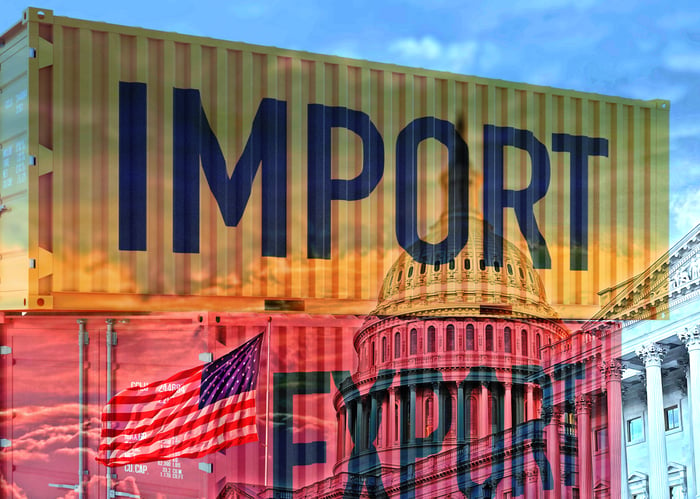Warren Buffett’s Views on Tariffs and Trade Deficit: A Closer Look
In a climate of market uncertainty and global economic concerns, investors are eagerly seeking insights from Warren Buffett, the renowned “Oracle of Omaha.” Unfortunately, Buffett has indicated that he will refrain from commenting on ongoing tariff negotiations and potential economic impacts until the Berkshire Hathaway (NYSE: BRK.A) (NYSE: BRK.B) annual meeting in early May.
Where to invest $1,000 right now? Our analyst team just revealed what they believe are the 10 best stocks to buy right now. Learn More »
Historical Context of Buffett’s Views on Tariffs
Buffett has publicly addressed tariffs and the U.S. trade deficit before. Contrary to what some might assume about the champion of free markets, his position on protectionism and tariffs is more complex than many believe. He has previously suggested that tariffs could have adverse effects on the economy. For instance, in March, he characterized tariffs as “an act of war, to some degree,” indicating his discontent with the administration’s trade strategy.
Buffett highlighted that these tariffs would effectively function as a tax on U.S. consumers, emphasizing that “the tooth fairy doesn’t pay ’em!” His critical perspective on tariffs echoes sentiments he expressed during the first Trump administration. In 2019, he warned that a trade war might make all parties worse off, stating, “If we actually have a trade war, it will be bad for the whole world.” He stressed the importance of free trade as a means to enhance global living standards.
Concerns Regarding the U.S. Trade Deficit
While criticizing tariffs, Buffett has also voiced concerns over the growing U.S. trade deficit. In 2003, he penned an editorial in Fortune Magazine, where he allocated a portion of Berkshire Hathaway’s cash into foreign currencies due to worries about the dollar’s value declining amidst a widening trade deficit. He noted that the U.S. was experiencing a concerning trend of ‘net worth’ being transferred abroad.
Buffett illustrated his point through a parable of two fictional islands: Squanderville (the U.S.) and Thriftville (foreign nations). In this allegory, while citizens of Thriftville work extra hours and generate surplus, Squanderville citizens become complacent, purchasing goods with debt. Over time, Squanderville accumulates rising debt, leading to tough choices: stimulate work or inflate its currency. This metaphor highlighted the risks of growing foreign ownership and its potential implications for future generations.

Image source: Getty Images.
Buffett’s Alternative Solution: “Import Certificates”
While some policymakers advocate for tariffs as a solution to these economic challenges, Buffett believes they are too blunt and can disrupt free market principles, resulting in dangerous geopolitical ramifications. As an alternative, he proposed the concept of “Import Certificates.”
Under this system, U.S. producers who export goods would earn import certificates for each unit sold abroad. These certificates could then be traded in a market, allowing equivalent imports into the U.S. This approach seeks to balance trade while providing financial benefits to exporters, effectively acting as a subsidy.
The trade of these certificates would not be restricted to specific industries, allowing the market to determine the composition of imports and exports. This method would help ensure that the government does not dictate trade flows, promoting a market-driven approach to addressing the trade balance.
Considering the Trade-Offs
Buffett acknowledges that his import certificate concept, similar to tariffs, could lead to higher prices for U.S. consumers. However, he argues that the benefits may outweigh these drawbacks. In his Fortune article, he summarized his views, indicating that while the remedy may share characteristics with tariffs, it aims for a more efficient market-driven solution.
Market Turmoil: Escalating Trade War Concerns Impact Investor Sentiment
The current trade strategy may appear gimmicky, resembling a tariff under a different name. However, it largely preserves free-market principles by avoiding protectionism for certain industries, refraining from penalizing specific countries, and working against the escalation of trade wars. This plan aims to enhance exports and could stimulate overall global trade without significantly reducing the dollar’s value.
Market instability today can be traced back to investor fears regarding the potential for an intensified trade conflict, which could destabilize the global economy. Additionally, concerns about rising bond rates may signal expectations of renewed inflation.
Investors should certainly consider the administration’s identification of the trade deficit as a significant issue. Yet, it is the approach towards addressing this concern that is prompting unease among market participants.
Warren Buffett’s proposed solution offers a sophisticated method for addressing the trade deficit while minimizing negative repercussions. If the administration were to consider implementing a system closer to import certificates, it could lead to a calmer market environment, encouraging renewed investment in U.S. stocks and bonds.
As negotiations regarding trade continue, it is crucial for investors to stay informed. They should watch whether discussions are advancing towards a solution reminiscent of Buffett’s import certificate model or veering into a more aggressive and potentially hazardous territory.
Should You Invest $1,000 in Berkshire Hathaway Now?
Before purchasing Berkshire Hathaway stock, it’s important to evaluate the following:
The Motley Fool Stock Advisor analyst team has recently identified what they believe are the 10 best stocks for current investment, and Berkshire Hathaway is notably absent from this list. The stocks selected could yield impressive returns in the years to come.
For instance, consider when Netflix was included on December 17, 2004. An investment of $1,000 at that time would now be worth $502,231!*
Similarly, when Nvidia made the list on April 15, 2005, a $1,000 investment would have grown to $678,552!*
It is also worth mentioning that Stock Advisor boasts a total average return of 800%, significantly outperforming the 156% return for the S&P 500. Don’t miss the latest top 10 list, available when you join Stock Advisor.
*Stock Advisor returns as of April 14, 2025
The views and opinions expressed herein are the views and opinions of the author and do not necessarily reflect those of Nasdaq, Inc.








